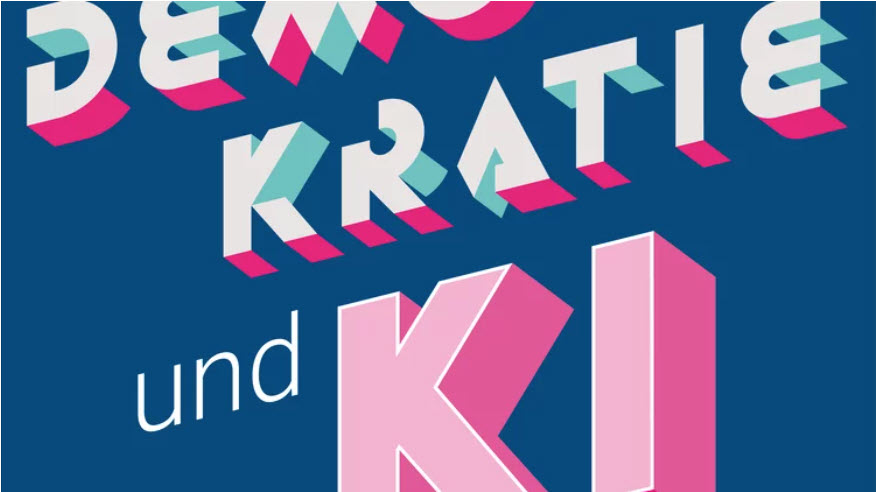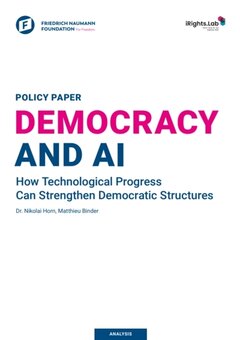Democracy
Democracy and AI - How technological progress can strengthen our democracy

Democracy and AI
© FNF (Erik Weber)New study by the Friedrich Naumann Foundation at re:publica on artificial intelligence and democracy
The discourse surrounding AI is often dominated by extreme positions: either threat scenarios are exaggerated or the benefits are overemphasised. It is time to look for a new narrative that is neither uncritically positive nor overly pessimistic.
The report ‘Democracy and AI - how technological progress can strengthen democracy’ analyses 30 global examples of the successful use of AI to strengthen democracy and serves as a basis for assessing the potential.
Zoe van Doren is a consultant for Global Digitalisation & Innovation and an expert on international digital policy.
A recent study by the German Civil Service Association paints an alarming picture: 63 per cent of public sector employees believe that the state they work for is overstretched. This concern is reinforced by the forecast that the public sector could face a shortage of over one million skilled workers by 2030, which corresponds to a fifth of the current workforce. Even more worrying is that 69 per cent of the population as a whole consider the state to be overstretched with its work. This figure has risen in recent years, with no end to the trend in sight. The question that inevitably arises here concerns our democratic system: what does this loss of confidence in the state's ability to function mean?
In order to regain trust, performance and citizen experience must be drastically improved. There is no way around better digitalisation. This also includes the strategic use of artificial intelligence (AI) to strengthen democracy. However, the discourse surrounding AI is often dominated by extreme positions: either threat scenarios are exaggerated or the benefits are overemphasised. It is time to look for a new narrative that is neither uncritically positive nor overly pessimistic. In this context, it is crucial to realistically assess the concrete potential of AI for strengthening democracy.
This is exactly what Dr Nikolai Horn and Matthieu Binder (both iRights.Lab) have done in their report ‘Democracy and AI - How technological progress can strengthen our democracy’ for the Friedrich Nauman Foundation for Freedom. The report will be published today, 27 May 2024, as part of re:publica, which is being held under the motto ‘who cares?’. To approach the question ‘who cares... for democracy?", the report uses 30 examples from around the world to analyse how the use of AI can strengthen democracy. The selected examples focus on various areas relevant to democracy:
- Protecting fundamental rights: How can AI be used to protect civil liberties and minorities in particular?
- Rule of law: How can AI help to monitor compliance with the law and the implementation of rule-of-law procedures and make them more transparent?
- Separation of powers: What potential do AI applications offer for legislative, executive and judicial powers?
- Popular sovereignty: How can AI support political decision-making and democratic participation and involvement?
- Democracy education and political education: What opportunities does AI offer for teaching political education and strengthening the culture of democratic discourse?
But how exactly can democracy be strengthened in these areas? When it comes to protecting fundamental rights, the municipal sign language avatar is already increasing accessibility and promoting social inclusion in many cities and municipalities in Germany. By processing extensive data sets and recognising patterns, AI systems are also ideal for combating corruption. In Ukraine, the Dozorro application is used to find corruption-prone tenders and awards in public procurement. The German system KriminelleNetzwerke also uses pattern recognition to uncover corruption and billing fraud in the German healthcare sector. Both applications promote the rule of law and support investigative authorities in their work.
The European Parliament also uses AI. The legislative process in the EU is also to be supported by AI: With the EP summariser, text documents from the Parliament's large treasure trove of data are to be recognised as relevant and, in a second step, correctly summarised in terms of content. In this way, existing databases and information can be better utilised in the legislative process. To this end, it provides MPs, their staff and the Parliament's administrative staff with various AI systems, in particular for multilingual text processing. Ultimately, the aim is to achieve better legislation.
A panel at re:publica with the deputy chair of the Friedrich Naumann Foundation, Sabine Leutheusser-Schnarrenberger, and the iRights.Lab team of experts will also be focussing on the report. In addition to the question of potential, possible concerns about individual applications and the challenges that AI presents us with in general will also be discussed. Initial surveys show that a small majority of society fears that AI will primarily have a negative impact on society.
This is one of the reasons why the study finally addresses the importance of non-technological prerequisites for the use of AI to promote democracy. When evaluating artificial intelligence, the German Ethics Council advocates taking the central aspects of the liberal concept of humanity, such as reason, responsibility and the ability to act, as a benchmark when assessing deployment scenarios for specific AI applications. When evaluating AI applications, it is therefore always necessary to analyse the extent to which they can expand or diminish human authorship. The normative, liberal view of humanity should serve as a starting point and fixed point for analysing the digital transformation and thus AI.
In our new report, you can find out how AI can be successfully integrated in this sense and actually contribute to strengthening democracy.

